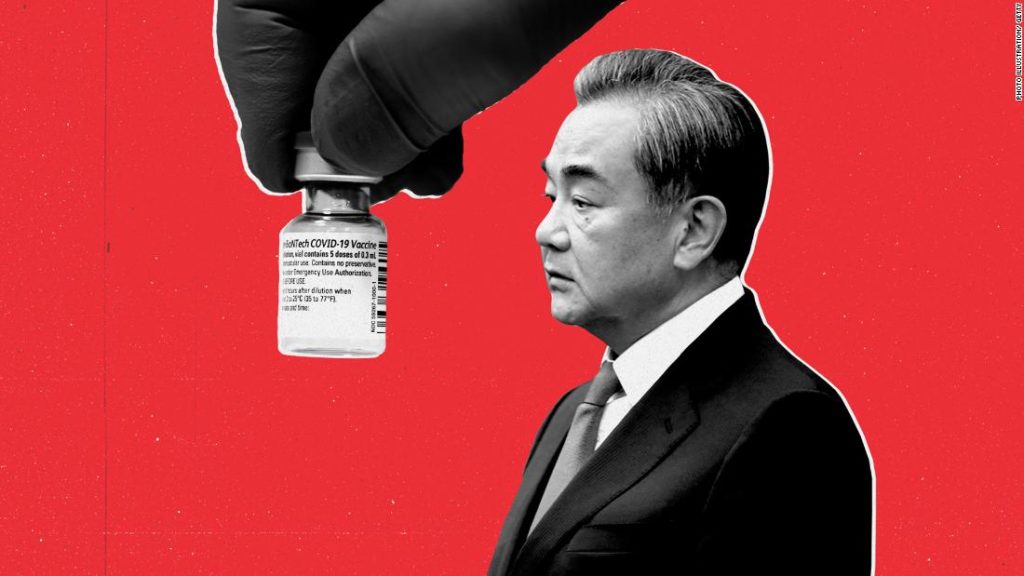Now, with negative sentiment towards China hardening in Western democracies due to trade wars and human rights issues, African allies — which have crucial voting rights at major international bodies — have arguably become an even more vital bloc for China to keep on side with its so-called vaccine diplomacy.
“The promises concerning vaccines in Africa have been really fake. There has been no timetable, only promises,” said W. Gyude Moore, a senior policy fellow at the Center for Global Development and former Liberian minister of public works. “Today, I am not aware of any African country that’s taking delivery of Chinese vaccines.”
A power house and a continent in need
Wang’s whistle-stop tour of Nigeria, the Democratic Republic of Congo, Botswana, Tanzania and the Seychelles continued a three-decade tradition of China’s top diplomat making his first international trip each year to Africa.
That tradition signals Africa’s diplomatic importance to China, with stops in places like the Seychelles, a sparsely populated archipelago, proving no nation is insignificant to Beijing, and serves to embarrass Western countries which typically neglect the continent but often view it as within their natural orbit of influence.
Across Africa, countries didn’t report the huge caseloads seen in India or the United States — as of Thursday, the continent had reported fewer than 70,000 deaths, compared to the 150,000 in India and more than twice that in the US.
Yet there was little chance of Wang being challenged on any of these points.
A health silk and road
On a bright blue-sky day last December, senior African diplomats, Chinese construction workers and officials, wearing surgical masks, gathered to celebrate breaking ground on a grand new building in the Ethiopian capital.
The headquarters of Africa CDC, an organization conceived in the wake of the 2014 Ebola crisis, will be at the heart of the continent’s healthcare planning in coming years — and has been subject to intense political wrangling between the US and China.
Launched in 2017, the organization originally received funding from the US, China, and the World Bank, among other donors, with Washington taking a leading role, including by paying the African CDC director’s salary in its early years.
The Chinese Ministry of Foreign Affairs did not reply to CNN’s questions on the matter of spying on government buildings it has constructed in Africa.
The Chinese have forged ahead with the plan, effectively ousting major US influence on the body, and signaling how important it is to Beijing to be front and center of what it calls the Health Silk Road — essentially, the export of its medical and scientific expertise globally.
A friend indeed
African nations are not totally without leverage when it comes to their relationships with Beijing.
While the pandemic has raged, so has China’s long-running trade war with the US — as well as a new one with Australia. It has also gotten into diplomatic disputes with the United Kingdom and Canada, which have condemned Beijing’s violation of democratic rights in Hong Kong.
“For international legitimacy, support is key in this region. With Africa, you have 54 votes in any international forum. That’s a huge bloc,” says Moore.
African countries typically negotiate with China as individual units, presenting a David and Goliath dynamic. This year, however, African heads of state are scheduled to meet with Beijing’s top brass in Senegal at the triennial Forum on China-Africa Cooperation (FOCAC), usually attended by the Chinese President. Should the event go ahead in person, there could be an opportunity for countries to come together to press Beijing to clarify a timeline on its delivery of vaccines to the continent.
A date for the event has not yet been set.
This year is likely to be the first in which Beijing will announce a smaller investment than at the previous FOCAC. In the absence of that monetary commitment, vaccines are likely to be the most pressing issue.
“African countries are so desperately in need of a vaccine, not because of the health implications, but because of the economic implications,” said Moore. “We’ll soon be living in a two-tier world, where Western countries will be opening the door after vaccinating their populations and developing countries, especially in Africa, will lack access to the rest of the world.”
Yet there is incentive for China to help African countries, says Yanzhoung Huang, a senior fellow for global health at the Council on Foreign Relations: “They want to improve China’s image. Secondly, they want to expand China’s market share of the Chinese vaccines. Third, they want to use vaccines as a strategic tool, especially in countries where China has strategic interest.”
While it is natural that China would want to vaccinate its most vulnerable before supplying other nations with resources, African leaders must be wondering what Xi means when he says African inoculations are a “priority.”
According to analysis by the Economist Intelligence Unit, coronavirus vaccines are unlikely to be available in most of sub-Saharan Africa until April 2022, at the earliest.
If the vaccines aren’t forthcoming, it will be hard for China to continue peddling the narrative that it shares “weal and woe” with its African brothers, when those on the continent it pledges solidarity with, remain exposed to the virus and thus trapped within their own borders as millions in China attempt to put the pandemic in the past.
You may also like
-
Afghanistan: Civilian casualties hit record high amid US withdrawal, UN says
-
How Taiwan is trying to defend against a cyber ‘World War III’
-
Pandemic travel news this week: Quarantine escapes and airplane disguises
-
Why would anyone trust Brexit Britain again?
-
Black fungus: A second crisis is killing survivors of India’s worst Covid wave

